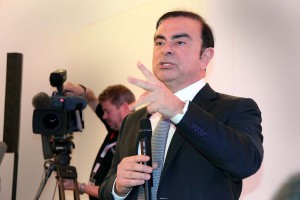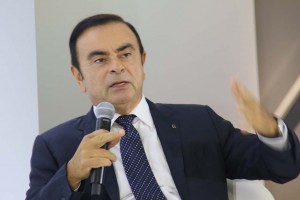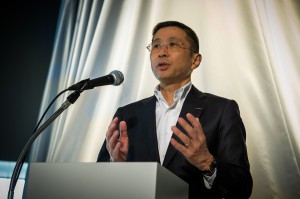
Carlos Ghosn was a traditional fixture at the Geneva Motor Show but is still behind bars as the 2019 event gets underway.
A Japanese court has finally approved bail for former Nissan Chairman Carlos Ghosn, potentially opening the door for him to step out of the Tokyo Detention Center for the first time since his arrest on charges of corruption on November 19.
But the release of the 64-year-old executive was delayed pending an appeal by prosecutors who had repeatedly blocked Ghosn’s bid for bail, alleging he was a flight risk and that he might use his freedom to tamper with evidence.
This marked the third bid for Ghosn’s release and comes just weeks after the once high-flying executive changed his legal team, turning to Junichiro Hironaka, a lawyer renowned for his ability to clear defendants in a country where prosecutors win over 90% of their cases. Hironaka had proposed to the Tokyo District Court ways to ensure Ghosn would comply with the requirements set by the court.
“It was good we proposed concrete ways showing how he would not tamper with evidence or try to flee,” said the attorney, who has come to be known by the nickname, “The Razor.”
(Ghosn’s new attorney blasts Nissan, Japanese prosecutors. Click Here for more.)
Ghosn was arrested minutes after landing at Tokyo’s Haneda Airport last November and immediately accused of hiding millions of dollars in income. Additional allegations followed, including claims he shifted some of his own financial losses onto Nissan. The charges were the result of an internal corporate investigation triggered, the company said, by a whistleblower.
Along with Ghosn, former Nissan official Greg Kelly was arrested and charged with assisting his former boss in the alleged scheme to conceal as much as $88 million in income.
For his part, Ghosn has repeatedly denied all charges, last month telling reporters from the Japanese newspaper, the Nikkei, that he was set up as part of a “coup.”
(Click Here to see how “plot and treason” brought Ghosn down, jailed exec says.)
As TheDetroitBureau.com has previously reported, a number of high-ranking sources, including ones close to the Nissan board, question the allegations and have argued that the case may, as much as anything, be linked to Nissan CEO Hiroto Saikawa’s desire to put distance between the Japanese automaker and its French ally Renault.
Ghosn first came to Japan in 1999, assigned to manage Renault’s $6 billion bid to rescue the floundering Nissan. Within three years he helped put the carmaker solidly back into the black and was subsequently named its CEO. Ghosn later added the title of Renault CEO, as well as the head of the Renault-Nissan Alliance. Three years ago, when Nissan took a controlling stake in the smaller Japanese automaker Mitsubishi, the Brazilian-born executive relinquished his day-to-day duties, moving into the chairman’s position at both Nissan and Mitsubishi.
At the time he was arrested, Ghosn was pressing forward with a plan that could have consolidated both Renault and Nissan into one company. They have continued operating as independent entities under the alliance. But the French automaker held a majority stake in its ally and was in a position to name Nissan board members and senior execs unilaterally – something Japanese management openly bridled over.
Whether there was a coup or a crime is something that the courts will have to address, and observers have said there was a real risk Ghosn might be kept in solitary confinement until the trial began, something that might not happen until late this year or even in 2020. He could yet be kept under lock and key if prosecutors succeed in blocking his bail.
(Shake-up and set-back for Ghosn. Click Here for the story.)
After his arrest, Ghosn was quickly fired by both Nissan and Mitsubishi and he subsequently resigned from Renault. The French automaker has since moved to block a lavish payoff for the executive, a decision that could see Ghosn forced to fight in a European court.
The corruption case has threatened to drive a wedge between Nissan and Renault, potentially killing what many observers have called the most successful alliance in the auto industry. On Tuesday, Renault’s new CEO Thierry Bollore took steps to ease tensions, however, during an interview at the Geneva Motor Show.
“The alliance is built on an equitable basis, rather than a show of strength” by any of the partner car companies, Bollore said.
For his part, Nissan’s Saikawa has reportedly been pressing to revise the terms of the alliance to limit Renault’s traditionally dominant position.


